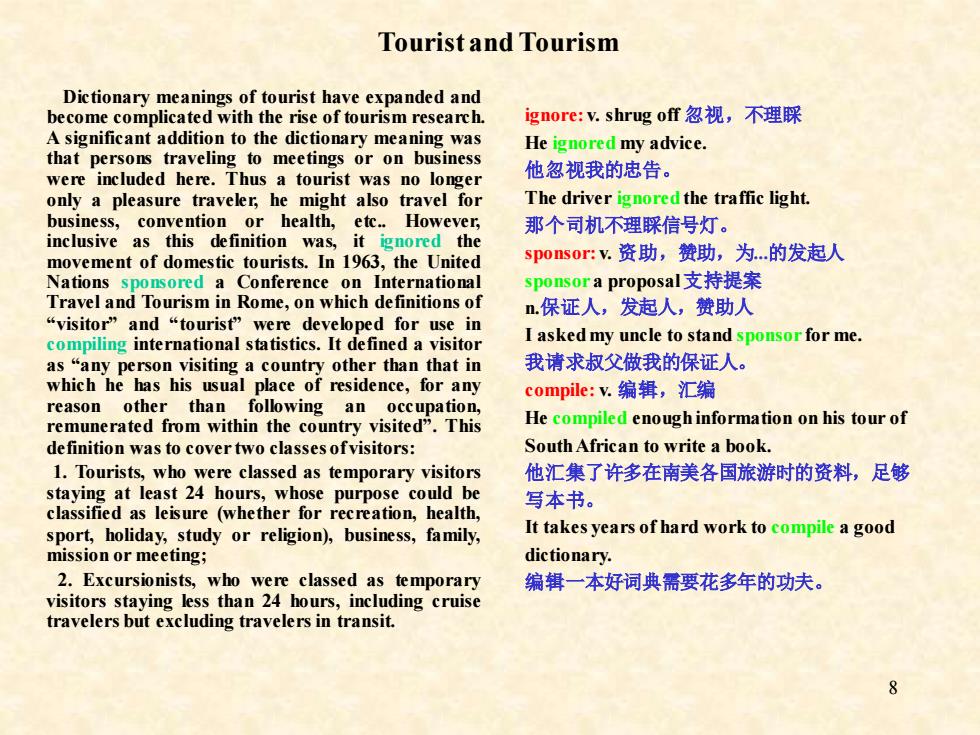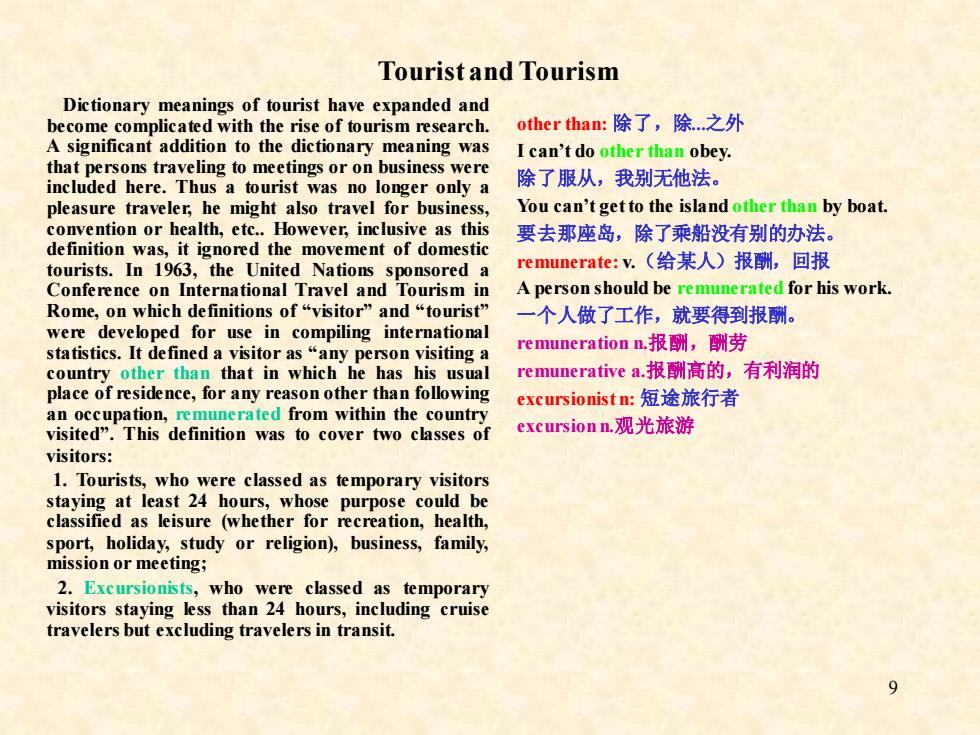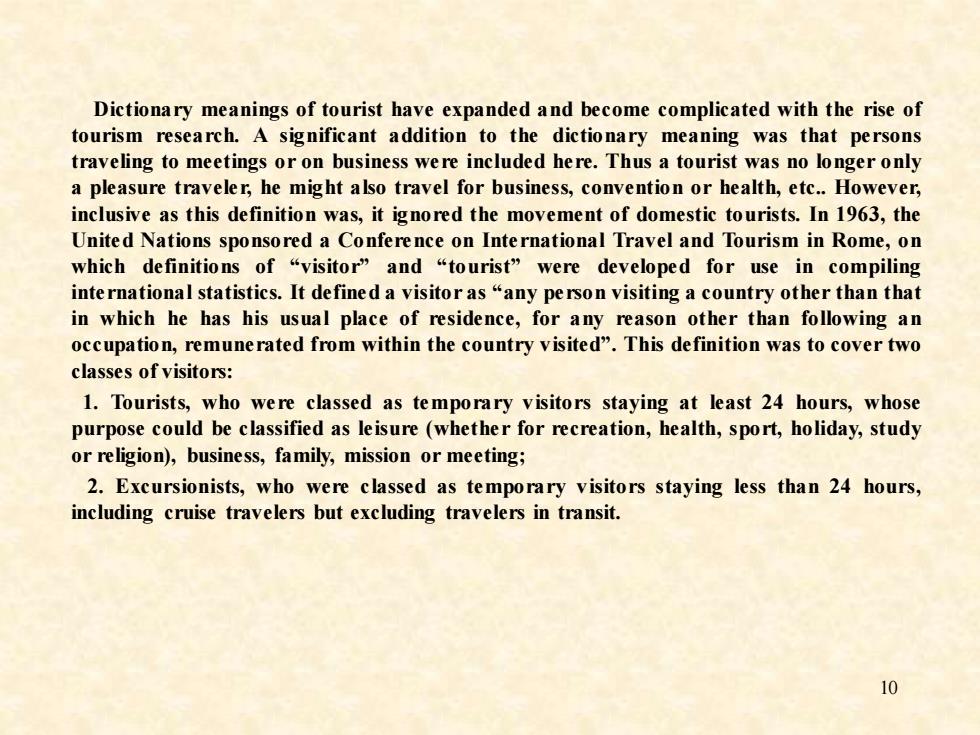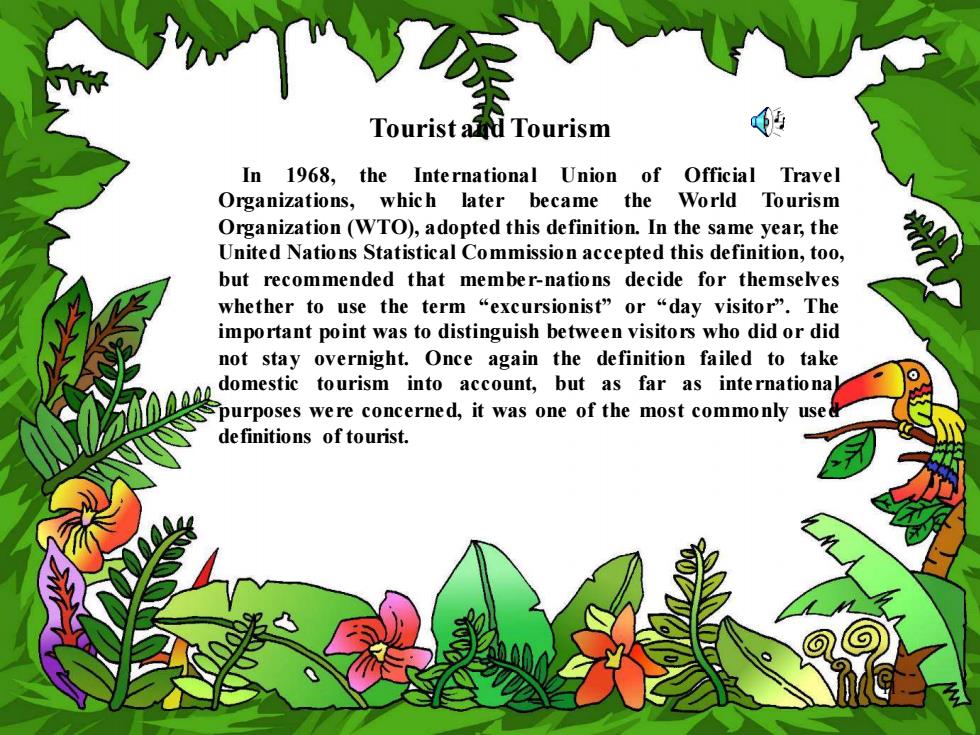
Tourist and Tourism Dictionary meanings of furist have expanded and become complicated with the rise of tourism research.A significant addition to the dictionary meaning was that persons traveling to meetings or on business were included here.Thus a tourist was no longer only a pleasure traveler he might also travel for business,convention or health,etc.. However inclusive as this definition was,it ignored the movement of domestic tourists.In 1963,the United Nations sponsored a Conference on. International Travel and Tourism in Rome,on which definitions of “visitor”and“tourist”were developed for use in compiling international statistics.It defined a visitor as "any person visiting a country other than that in which he has his usual place of residence,for any reason other following an occupation,remunerated from within the Kisited".This definition was to cover two classes of visitors: 1.Tourists,who were classed as temporary visitors staying at leas 2 hours, whose purpose could be classified as leisure (whether for ecreation,health,sport,holiday,study or religion),business, miy ission or meeting; staying than 24 hours,inc luding velers b elers
7 Tourist and Tourism Dictionary meanings of tourist have expanded and become complicated with the rise of tourism research. A significant addition to the dictionary meaning was that persons traveling to meetings or on business were included here. Thus a tourist was no longer only a pleasure traveler, he might also travel for business, convention or health, etc.. However, inclusive as this definition was, it ignored the movement of domestic tourists. In 1963, the United Nations sponsored a Conference on International Travel and Tourism in Rome, on which definitions of “visitor” and “tourist” were developed for use in compiling international statistics. It defined a visitor as “any person visiting a country other than that in which he has his usual place of residence, for any reason other than following an occupation, remunerated from within the country visited”. This definition was to cover two classes of visitors: 1. Tourists, who were classed as temporary visitors staying at least 24 hours, whose purpose could be classified as leisure (whether for recreation, health, sport, holiday, study or religion), business, family, mission or meeting; 2. Excursionists, who were classed as temporary visitors staying less than 24 hours, including cruise travelers but excluding travelers in transit

Tourist and Tourism Dictionary meanings of tourist have expanded and become complicated with the rise of tourism research. ignore:V.shrug off忽视,不理睬 A significant addition to the dictionary meaning was He ignored my advice. that persons traveling to meetings or on business were included here.Thus a tourist was no longer 他忽视我的忠告。 only a pleasure traveler,he might also travel for The driver ignored the traffic light. business,convention or health,etc..However, 那个司机不理睬信号灯。 inclusive as this definition was,it ignored the movement of domestic tourists.In 1963,the United sponsor:v资助,赞助,为.的发起人 Nations sponsored a Conference on International sponsora proposal支持提案 Travel and Tourism in Rome,on which definitions of n.保证人,发起人,赞助人 “visitor'”and“tourist”were developed for use in compiling international statistics.It defined a visitor I asked my uncle to stand sponsor for me. as "any person visiting a country other than that in 我请求叔父做我的保证人。 which he has his usual place of residence,for any compile::v编辑,汇编 reason other than following an occupation, remunerated from within the country visited".This He compiled enough information on his tour of definition was to cover two classes ofvisitors: South African to write a book. 1.Tourists,who were classed as temporary visitors 他汇集了许多在南美各国旅游时的资料,足够 staying at least 24 hours,whose purpose could be 写本书。 classified as leisure (whether for recreation,health, sport,holiday,study or religion),business,family, It takes years of hard work to compile a good mission or meeting; dictionary. 2.Excursionists,who were classed as temporary 编辑一本好词典需要花多年的功夫。 visitors staying less than 24 hours,including cruise travelers but excluding travelers in transit. 8
8 Tourist and Tourism Dictionary meanings of tourist have expanded and become complicated with the rise of tourism research. A significant addition to the dictionary meaning was that persons traveling to meetings or on business were included here. Thus a tourist was no longer only a pleasure traveler, he might also travel for business, convention or health, etc.. However, inclusive as this definition was, it ignored the movement of domestic tourists. In 1963, the United Nations sponsored a Conference on International Travel and Tourism in Rome, on which definitions of “visitor” and “tourist” were developed for use in compiling international statistics. It defined a visitor as “any person visiting a country other than that in which he has his usual place of residence, for any reason other than following an occupation, remunerated from within the country visited”. This definition wasto cover two classes of visitors: 1. Tourists, who were classed as temporary visitors staying at least 24 hours, whose purpose could be classified as leisure (whether for recreation, health, sport, holiday, study or religion), business, family, mission or meeting; 2. Excursionists, who were classed as temporary visitors staying less than 24 hours, including cruise travelers but excluding travelers in transit. ignore: v. shrug off 忽视,不理睬 He ignored my advice. 他忽视我的忠告。 The driver ignoredthe traffic light. 那个司机不理睬信号灯。 sponsor: v. 资助,赞助,为...的发起人 sponsor a proposal支持提案 n.保证人,发起人,赞助人 I askedmy uncle to stand sponsor for me. 我请求叔父做我的保证人。 compile: v. 编辑,汇编 He compiled enoughinformation on his tour of SouthAfrican to write a book. 他汇集了许多在南美各国旅游时的资料,足够 写本书。 It takes years of hard work to compile a good dictionary. 编辑一本好词典需要花多年的功夫

Tourist and Tourism Dictionary meanings of tourist have expanded and become complicated with the rise of tourism research. other than:除了,除之外 A significant addition to the dictionary meaning was I can't do other than obey. that persons traveling to meetings or on business were included here.Thus a tourist was no longer only a 除了服从,我别无他法。 pleasure traveler,he might also travel for business, You can't get to the island other than by boat. convention or health,etc..However,inclusive as this 要去那座岛,除了乘船没有别的办法。 definition was,it ignored the movement of domestic tourists.In 1963,the United Nations sponsored a remunerate:v.(给某人)报酬,回报 Conference on International Travel and Tourism in A person should be remunerated for his work. Rome,on which definitions of“visitor'”and“tourist"” 一个人做了工作,就要得到报酬。 were developed for use in compiling international statistics.It defined a visitor as "any person visiting a remuneration n.报酬,酬劳 country other than that in which he has his usual remunerative a.报酬高的,有利润的 place of residence,for any reason other than following excursionistn:短途旅行者 an occupation,remunerated from within the country visited".This definition was to cover two classes of excursion n.观光旅游 visitors: 1.Tourists,who were classed as temporary visitors staying at least 24 hours,whose purpose could be classified as leisure (whether for recreation,health, sport,holiday,study or religion),business,family, mission or meeting; 2.Excursionists,who were classed as temporary visitors staying less than 24 hours,including cruise travelers but excluding travelers in transit. 9
9 Tourist and Tourism Dictionary meanings of tourist have expanded and become complicated with the rise of tourism research. A significant addition to the dictionary meaning was that persons traveling to meetings or on business were included here. Thus a tourist was no longer only a pleasure traveler, he might also travel for business, convention or health, etc.. However, inclusive as this definition was, it ignored the movement of domestic tourists. In 1963, the United Nations sponsored a Conference on International Travel and Tourism in Rome, on which definitions of “visitor” and “tourist” were developed for use in compiling international statistics. It defined a visitor as “any person visiting a country other than that in which he has his usual place of residence, for any reason other than following an occupation, remunerated from within the country visited”. This definition was to cover two classes of visitors: 1. Tourists, who were classed as temporary visitors staying at least 24 hours, whose purpose could be classified as leisure (whether for recreation, health, sport, holiday, study or religion), business, family, mission or meeting; 2. Excursionists, who were classed as temporary visitors staying less than 24 hours, including cruise travelers but excluding travelers in transit. other than: 除了,除...之外 I can’t do other than obey. 除了服从,我别无他法。 You can’t getto the island other than by boat. 要去那座岛,除了乘船没有别的办法。 remunerate: v.(给某人)报酬,回报 A person should be remunerated for his work. 一个人做了工作,就要得到报酬。 remuneration n.报酬,酬劳 remunerative a.报酬高的,有利润的 excursionist n: 短途旅行者 excursionn.观光旅游

Dictionary meanings of tourist have expanded and become complicated with the rise of tourism research.A significant addition to the dictionary meaning was that persons traveling to meetings or on business were included here.Thus a tourist was no longer only a pleasure traveler,he might also travel for business,convention or health,etc..However, inclusive as this definition was,it ignored the movement of domestic tourists.In 1963,the United Nations sponsored a Conference on International Travel and Tourism in Rome,on which definitions of“visitor'”and“tourist”were developed for use in compiling international statistics.It defined a visitor as "any person visiting a country other than that in which he has his usual place of residence,for any reason other than following an occupation,remunerated from within the country visited".This definition was to cover two classes of visitors: 1.Tourists,who were classed as temporary visitors staying at least 24 hours,whose purpose could be classified as leisure (whether for recreation,health,sport,holiday,study or religion),business,family,mission or meeting; 2.Excursionists,who were classed as temporary visitors staying less than 24 hours, including cruise travelers but excluding travelers in transit. 10
10 Dictionary meanings of tourist have expanded and become complicated with the rise of tourism research. A significant addition to the dictionary meaning was that persons traveling to meetings or on business were included here. Thus a tourist was no longer only a pleasure traveler, he might also travel for business, convention or health, etc.. However, inclusive as this definition was, it ignored the movement of domestic tourists. In 1963, the United Nations sponsored a Conference on International Travel and Tourism in Rome, on which definitions of “visitor” and “tourist” were developed for use in compiling international statistics. It defined a visitor as “any person visiting a country other than that in which he has his usual place of residence, for any reason other than following an occupation, remunerated from within the country visited”. This definition was to cover two classes of visitors: 1. Tourists, who were classed as temporary visitors staying at least 24 hours, whose purpose could be classified as leisure (whether for recreation, health, sport, holiday, study or religion), business, family, mission or meeting; 2. Excursionists, who were classed as temporary visitors staying less than 24 hours, including cruise travelers but excluding travelers in transit

Tourist azd Tourism In 1968,the International Union of Official Travel Organizations,which later became the World Tourism Organization(WTO),adopted this definition.In the same year,the United Nations Statistical Commission accepted this definition,too, but recommended that member-nations decide for themselves whether to use the term“excursionist”or“day visitor'”.The important point was to distinguish between visitors who did or did not stay overnight.Once again the definition failed to take domestic tourism into account,but as far as internationa purposes were concerned,it was one of the most commonly used definitions of tourist
11 Tourist and Tourism In 1968, the International Union of Official Travel Organizations, which later became the World Tourism Organization (WTO), adopted this definition. In the same year, the United Nations Statistical Commission accepted this definition, too, but recommended that member-nations decide for themselves whether to use the term “excursionist” or “day visitor”. The important point was to distinguish between visitors who did or did not stay overnight. Once again the definition failed to take domestic tourism into account, but as far as international purposes were concerned, it was one of the most commonly used definitions of tourist